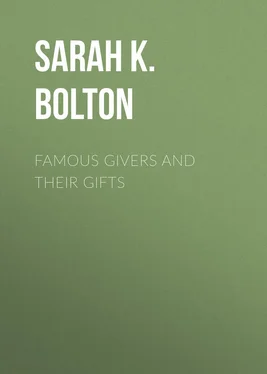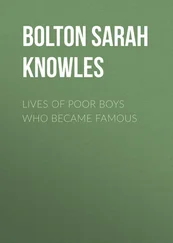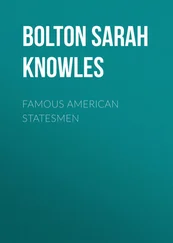Sarah Bolton - Famous Givers and Their Gifts
Здесь есть возможность читать онлайн «Sarah Bolton - Famous Givers and Their Gifts» — ознакомительный отрывок электронной книги совершенно бесплатно, а после прочтения отрывка купить полную версию. В некоторых случаях можно слушать аудио, скачать через торрент в формате fb2 и присутствует краткое содержание. Жанр: foreign_antique, foreign_prose, на английском языке. Описание произведения, (предисловие) а так же отзывы посетителей доступны на портале библиотеки ЛибКат.
- Название:Famous Givers and Their Gifts
- Автор:
- Жанр:
- Год:неизвестен
- ISBN:нет данных
- Рейтинг книги:4 / 5. Голосов: 1
-
Избранное:Добавить в избранное
- Отзывы:
-
Ваша оценка:
- 80
- 1
- 2
- 3
- 4
- 5
Famous Givers and Their Gifts: краткое содержание, описание и аннотация
Предлагаем к чтению аннотацию, описание, краткое содержание или предисловие (зависит от того, что написал сам автор книги «Famous Givers and Their Gifts»). Если вы не нашли необходимую информацию о книге — напишите в комментариях, мы постараемся отыскать её.
Famous Givers and Their Gifts — читать онлайн ознакомительный отрывок
Ниже представлен текст книги, разбитый по страницам. Система сохранения места последней прочитанной страницы, позволяет с удобством читать онлайн бесплатно книгу «Famous Givers and Their Gifts», без необходимости каждый раз заново искать на чём Вы остановились. Поставьте закладку, и сможете в любой момент перейти на страницу, на которой закончили чтение.
Интервал:
Закладка:
Judge White of Lawrence, Mass., left at his death a tract of land in the hands of three trustees, which they were to sell, and use the income to provide a course of not less than six lectures yearly, especially to the industrial classes. The subjects were to be along the line of good morals, industry, economy, the fruits of sin and of virtue. The White fund amounts to about one hundred thousand dollars.
Mrs. Mary Hemenway of Boston, who died March 6, 1894, will always be remembered for her good works, not the least of which are the yearly courses of free lectures for young people at the Old South Church. When the meeting-house where Benjamin Franklin was baptized, where the town meeting was held after the Boston Massacre in 1770, and just before the tea was thrown overboard in 1773, and which the British troops used for a riding-school in 1775, – when this historic place was in danger of being torn down because business interests seemed to demand the location, Mrs. Hemenway, with other Boston women, came forward in 1876 to save it. She once said to Mr. Larkin Dunton, head master of the Boston Normal School, "I have just given a hundred thousand dollars to save the Old South; yet I care nothing for the church on the corner lot. But, if I live, such teaching shall be done in that old building, and such an influence shall go out from it, as shall make the children of future generations love their country so tenderly that there can never be another civil war in this country."
Mrs. Hemenway was patriotic. When asked why she gave one hundred thousand dollars to Tileston Normal School in Wilmington, N.C., – her maiden name was Tileston, – and thus provide for schools in the South, she replied, "When my country called for her sons to defend the flag, I had none to give. Mine was but a lad of twelve. I gave my money as a thank-offering that I was not called to suffer as other mothers who gave their sons and lost them. I gave it that the children of this generation might be taught to love the flag their fathers tore down."
In December, 1878, Miss C. Alice Baker began at the Old South Church a series of talks to children on New England history, between eleven and twelve o'clock on Saturdays, which she called, "The Children's Hour." From the relics on the floor and in the gallery, telling of Colonial times, she riveted their attention, thus showing to the historical societies of this country how easily they might interest and profit the children of our public schools, if these were allowed to visit museums in small companies with suitable leaders.
From this year, 1878, the excellent work has been carried on. Every year George Washington's birthday is appropriately celebrated at the Old South Meeting-house, with speeches and singing of national patriotic airs by the children of the public schools. In 1879 Mr. John Fiske, the noted historical writer, gave a course of lectures on Saturday mornings upon The Discovery and Colonization of America. These were followed in succeeding years by his lectures on The American Revolution, and others that are now published in book form. These were more especially for the young, but adults seemed just as eager to hear them as young persons.
Regular courses of free lectures for young people were established in the summer of 1883, more especially for those who did not leave the city during the long summer vacations. The lectures are usually given on Wednesday afternoons in July and August. A central topic is chosen for the season, such as Early Massachusetts History, The War for the Union, The War for Independence, The Birth of the Nation, The American Indians, etc.; and different persons take part in the course.
With each lecture a leaflet of four or eight pages is given to those who attend, and these leaflets can be bound at the end of the season for a small sum. "These are made up, for the most part, from original papers treated in the lectures," says Mr. Edwin D. Mead who prepares them, "in the hope to make the men and the public life of the periods more clear and real." These leaflets are very valuable, the subjects being, "The Voyages to Vinland, from the Saga of Eric the Red," "Marco Polo's Account of Japan and Java," "The Death of De Soto from the Narrative of a Gentleman of Elvas," etc. They are furnished to the schools at the bare cost of paper and printing. Mr. Mead, the scholarly author, and editor of the New England Magazine , has been untiring in the Old South work, and has been the means of several other cities adopting like methods for the study of early history, especially by young people.
Every year since 1881 four prizes, two of forty dollars, and two of twenty-five dollars each, have been offered to high school pupils soon to graduate, and also to those recently graduated, for the best essays on assigned topics of American history. Those who compete and do not win a prize receive a present of valuable books in recognition of their effort. From the first, Mrs. Hemenway was the enthusiastic friend and promoter of the Old South work. She spent five thousand a year, for many years, in carrying it forward, and left provision for its continuation at her death. It is not too much to say that these free lectures have stimulated the study of our early history all over the country, and made us more earnest lovers of our flag and of our nation. The world has little respect for a "man without a country."
"Breathes there the man with soul so dead
Who never to himself hath said,
'This is my own, my native land!'
Whose heart hath ne'er within him burned
As home his footsteps he hath turned
From wandering on a foreign strand?"
Mrs. Hemenway did not cease her good work with her free lectures for young people. It is scarcely easier to stop in an upward career than in a downward. When the heart and hand are once opened to the world's needs, they can nevermore be closed.
Mrs. Hemenway, practical with all her wealth, believed that everybody should know how to work, and thus not only be placed above want, but dignify labor. She said, "In my youth, girls in the best families were accustomed to participate in many of the household affairs. Some occasionally assisted in other homes. As for myself, I read not many books. They were not so numerous as now. I was reared principally on household duties, the Bible, and Shakespeare."
Mrs. Hemenway began by establishing kitchen gardens in Boston, opened on Saturdays. I remember going to one of them at the North End, in 1881, through the invitation of Mrs. Hemenway's able assistant, Miss Amy Morris Homans. In a large, plain room of the "Mission" I found twenty-four bright little girls seated at two long tables. They were eager, interesting children, but most had on torn and soiled dresses and poor shoes.
In front of each stood a tiny box, used as a table, on which were four plates, each a little over an inch wide; four knives, each three inches long, and forks to correspond; goblets, and cups and saucers of the same diminutive sizes.
At a signal from the piano, the girls began to set the little tables properly. First the knives and forks were put in their places, then the very small napkins, and then the goblets. In front of the "lady of the house" were set the cups and saucers, spoon-holder, water-pitcher, and coffee-pot.
Then they listened to a useful and pleasant talk from the leader; and when the order was given to clear the tables, twenty-four pairs of little hands put the pewter dishes, made to imitate silver, into a pitcher, and the other things into dishpans, about four or five inches wide, singing a song to the music of the piano as they washed the dishes. These children also learned to sweep and dust, make beds, and perform other household duties. Each pupil was given a complete set of new clothes by Mrs. Hemenway.
Many persons had petitioned to have sewing taught in the public schools of Boston, as in London; but there was opposition, and but little was accomplished. Mrs. Hemenway started sewing-schools, obtained capable teachers, and in time sewing became a regular part of the public-school work, with a department of sewing in the Boston Normal School; so that hereafter the teacher will be as able in her department as another in mathematics. Drafting, cutting, and fitting have been added in many schools, so that thousands of women will be able to save expense in their homes through the skill of their own hands.
Читать дальшеИнтервал:
Закладка:
Похожие книги на «Famous Givers and Their Gifts»
Представляем Вашему вниманию похожие книги на «Famous Givers and Their Gifts» списком для выбора. Мы отобрали схожую по названию и смыслу литературу в надежде предоставить читателям больше вариантов отыскать новые, интересные, ещё непрочитанные произведения.
Обсуждение, отзывы о книге «Famous Givers and Their Gifts» и просто собственные мнения читателей. Оставьте ваши комментарии, напишите, что Вы думаете о произведении, его смысле или главных героях. Укажите что конкретно понравилось, а что нет, и почему Вы так считаете.












